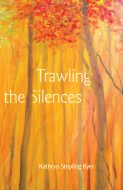 Kathryn Stripling Byer
Kathryn Stripling Byer
Trawling the Silences
Jacar Press
Reviewer: Richard Allen Taylor
Trawling the Silences, according to the substantial, well-written bio at the end of the book, was an unfinished manuscript at the time of Kathryn Stripling Byer’s[1] death in 2017. What makes it “unfinished” is not explained. Perhaps there were drafts of uncompleted poems discovered on the poet’s desk or in her computer. Maybe she told a few close friends there were more poems to write to fulfill her vision of the book. What can I say? When I read this collection, it felt complete. Or at least, it felt satisfying, as if I had sat down to a banquet and eaten my fill, but not so much as to cause heartburn. If the book was unfinished in any respect, perhaps we can credit good editing for making it feel complete.
If there is a poem “missing” from this volume, it’s the “Goodbye, Reader” poem. Such a poem would surely be here, if it existed. On the other hand, Byer does have several poems that look ahead to death. The title poem is the finest and bravest of those:
This end-of-March day, I’d rather watch hawks surf the
thermals than contemplate what lies ahead.
… In the few hours left, let me keep
my doubts shut, my windows wide open, their sheer curtains
billowing. It’s March, after all, having come in
a lamb and departing a lioness, stalking my back yard …
Anyone who has lost a loved one to a long illness will recognize the courage in this poem. “In the few hours left,” she keeps her windows “wide open,” as if to say, “I’m not done yet.” She sees departing March as a lioness and later drafts the lioness (a symbol of bravery) as an avatar for herself. She prays, “Give her [the lioness] another day … Give the birds one more day / scolding the rapscallion squirrels stealing birdseed.” Typical of Byer, this poem resonates with her love of nature and her unsurpassed ability to fashion powerful images with plain words.
While Byer wrote mostly in free verse, she occasionally wrote in form. “Sarabande,” for example, is a ghazal, consisting in this case of nine couplets. The second line of each couplet ends with “mountain” (or “mountains”). I’ll showcase the first and last couplets of the poem.
First couplet: “I imagined the clouds beyond cornfields were mountains. / When I grow up, I said, I will live in the mountains.” So far, the poem is autobiographical. According to her bio, Byer loved the symbology of corn and used it as a personal emblem. And she loved the mountains. She grew up in the coastal plains of Georgia and moved to the mountains of North Carolina sometime after college. Mountains figure prominently in her poetry, not only in this collection, but in previous books as well. In this poem, couplets two through eight move the reader beyond her childhood imaginings to verses about her grandmother, tectonic plates (which “dance a medieval sarabande,” hence the poem title), lichens that “push up though the granite like dreams,” and lovers who say what they mean, leading to the ninth and final couplet: “My daydreaming girl has become a grown woman, / a katydid tuning her wings to the pitch of her mountain.”
Observe the muscularity of her poem. She is the daydreaming girl and the grown woman. She is also the katydid. I think of katydids as agile and free. I see the katydid turning her wings, but the poet wrote “tuning,” not turning. I still see the katydid turning in flight but yield to the poet’s desire for me to hear the grasshopper tuning her wings to the “pitch of her mountain,” which could refer to either the steepness of the mountain being climbed or the music it sings in the wind (numerous possibilities expressed within two lines).
Some of the poems in this collection strongly suggest that Byer knew that she was terminally ill. Others send no such signals. In “Cousins,” Byer loosens her sense of humor along with her senses of family and history. “We used to steal roses,” she writes, “Not to mention the usual zinnias and bachelor buttons. / We stashed them in woodpecker holes, / arranged them in cow pies and laughed. Dinner’s served, / we announced to the cud-chewers.” The cousin is never named in the poem, but it’s clear (assuming the poem’s story is autobiographical) that she is the same age as the author, and the two of them together were formidable in their rough-and-ready country-girlishness.
We had no fountains in our yards,
no Grecian nosed goddesses endlessly pouring libations.
We had buckets and hoses.
We splashed.
…
We knew how to hoist a load,
lug a watering pot.
The dirt squished between our stubbed toes
that could never have been Aphrodite’s.
Any poet who loves corn must write about crows. In “Listen,” Byer begins, “The crows wake up early.” She dares an unspecified “you” (possibly herself) to get up, get out, and seize the day:
Throw down your toothbrush.
Let fall your nightgown
and walk out the back door.
The grass blades will never
again feel so whetted,
the earth underfoot so forgiving.
If Byer was daring herself to take advantage of opportunities, to live every day with wakened senses and passion for life, she challenges us to do the same. My toothbrush is hitting the floor right now.
[1] Kathryn Stripling Byer (1944-2017) was North Carolina’s first female poet laureate. She served in that position from 2005 to 2009. Among the many literary honors and awards she received during her career, she is perhaps best known as the winner of the 1992 Lamont Poetry Prize for her second book, Wildwood Flower, and as a 2012 inductee into the North Carolina Literary Hall of Fame. She taught for many years at Western Carolina University.

